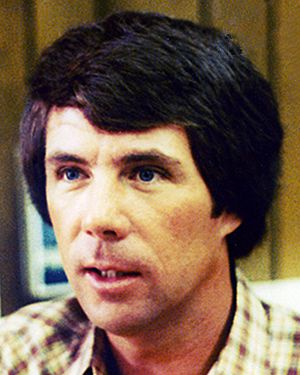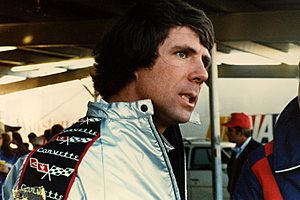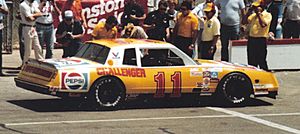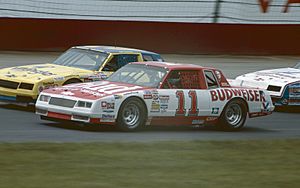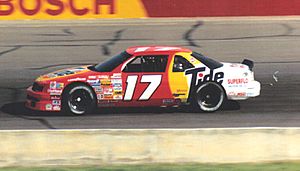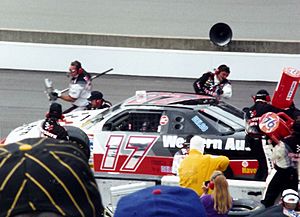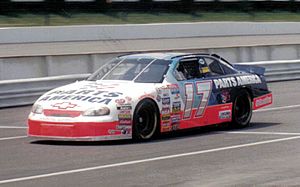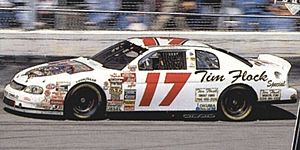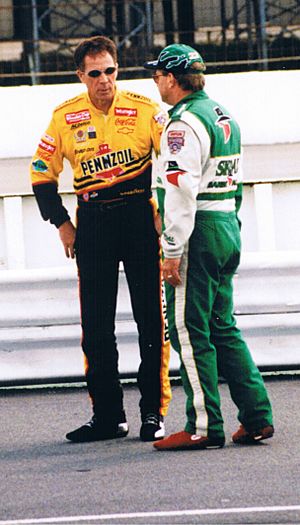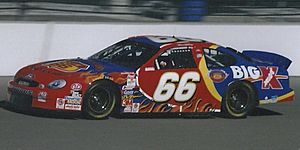Darrell Waltrip facts for kids
Quick facts for kids Darrell Waltrip |
|||||||
|---|---|---|---|---|---|---|---|
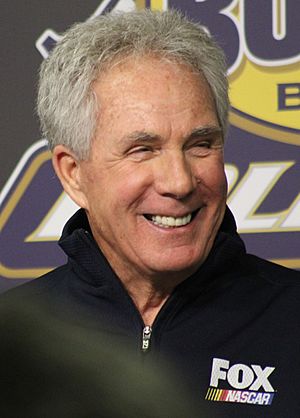
Waltrip at Bristol Motor Speedway in 2019
|
|||||||
| Born | Darrell Lee Waltrip February 5, 1947 Owensboro, Kentucky, U.S. |
||||||
| Achievements | 1981, 1982, 1985 Winston Cup Series Champion 1989 Daytona 500 Winner 1992 Southern 500 Winner 1978, 1979, 1985, 1988, 1989 Coca-Cola 600 Winner 1977, 1982 Winston 500 Winner 1985 The Winston Winner (inaugural race) 1981 Busch Clash Winner 1976 Snowball Derby Winner 1987 All American 400 Winner 1986, 1987 World Crown 300 Winner 1970, 1973 Fairgrounds Speedway Track Champion |
||||||
| Awards | 1989, 1990 Winston Cup Series Most Popular Driver Named one of NASCAR's 50 Greatest Drivers (1998) International Motorsports Hall of Fame (2005) Motorsports Hall of Fame of America (2003) NASCAR Hall of Fame (2012) Fairgrounds Speedway Hall of Fame (2001) Named one of NASCAR's 75 Greatest Drivers (2023) |
||||||
| NASCAR Cup Series career | |||||||
| 809 races run over 29 years | |||||||
| Best finish | 1st (1981, 1982, 1985) | ||||||
| First race | 1972 Winston 500 (Talladega) | ||||||
| Last race | 2000 NAPA 500 (Atlanta) | ||||||
| First win | 1975 Music City USA 420 (Nashville) | ||||||
| Last win | 1992 Southern 500 (Darlington) | ||||||
|
|||||||
| NASCAR Xfinity Series career | |||||||
| 95 races run over 14 years | |||||||
| Best finish | 22nd (1986) | ||||||
| First race | 1982 Mello Yello 300 (Charlotte) | ||||||
| Last race | 2006 Goody's 250 (Martinsville) | ||||||
| First win | 1982 Miller Time 300 (Charlotte) | ||||||
| Last win | 1989 Goody's 300 (Daytona) | ||||||
|
|||||||
| NASCAR Gander RV & Outdoors Truck Series career | |||||||
| 17 races run over 6 years | |||||||
| Best finish | 37th (1996) | ||||||
| First race | 1995 Heartland Tailgate 175 (Heartland) | ||||||
| Last race | 2005 Kroger 200 (Martinsville) | ||||||
|
|||||||
| NASCAR Grand National East Series career | |||||||
| 1 race run over 1 year | |||||||
| First race | 1973 Salem 100 (Salem) | ||||||
|
|||||||
Darrell Lee Waltrip (born February 5, 1947) is a famous American motorsports expert, author, and former stock car driver. He raced in the top NASCAR Cup Series from 1972 to 2000. He is best known for driving the No. 11 Chevrolet for Junior Johnson. Waltrip won the Cup Series championship three times: in 1981, 1982, and 1985.
Many people consider Darrell Waltrip one of the greatest drivers in NASCAR history. He won 84 NASCAR Cup Series races. This includes the exciting 1989 Daytona 500. He also won the Coca-Cola 600 a record five times. He holds the track record at Bristol Motor Speedway with 12 wins. Waltrip is fifth on NASCAR's all-time wins list in the Cup Series. He also has 59 pole positions, which means he started in the very front of the race many times.
Waltrip competed in 809 Cup races over 29 years. He finished in the top five 271 times and in the top ten 390 times. He was the first NASCAR driver to earn over $10 million in prize money. Besides Cup Series races, he won 13 NASCAR Busch Grand National Series races. He also won races in other series like American Speed Association (ASA) and IROC. He holds a record 67 wins at the Fairgrounds Speedway in Nashville, Tennessee.
He received many awards, including "NASCAR's Most Popular Driver" twice. He was named one of NASCAR's 50 Greatest Drivers in 1998. He is a member of the NASCAR Hall of Fame (inducted in 2012). After retiring from racing, Waltrip became a popular TV commentator for Fox Sports. He is the older brother of former NASCAR driver Michael Waltrip.
Contents
Early Racing Days
Darrell Waltrip was born on February 5, 1947, in Owensboro, Kentucky. He started racing Go-karts when he was 12 years old. Just four years later, he entered his first stock car race. He and his father built a 1936 Chevrolet car for it.
His first race was not a success, as he crashed the car. But Waltrip soon found his talent on asphalt tracks. His smooth driving style, learned from go-karts, helped him a lot. He raced at tracks like Kentucky Motor Speedway. His success caught the eye of P. B. Crowell, a car owner from Nashville.
Waltrip moved to Nashville to race at the Fairgrounds Speedway. He won two track championships there in 1970 and 1973. He was good at promoting races on local TV. He would talk about other drivers, which helped sell tickets. This made the races very popular.
He became friends with radio host Ralph Emery. Waltrip often appeared on Emery's TV show. This helped him become well-known and prepared him for NASCAR's big leagues. In 1983, Waltrip became a Christian. He later said his faith became the most important thing in his life. He supports charities like Motor Racing Outreach, which helps racers and their families.
NASCAR Career Highlights
Starting in NASCAR: 1972–1975
Waltrip began racing in the NASCAR Winston Cup Series when he was 25. His first race was on May 7, 1972, at the Talladega Superspeedway in Alabama. He drove a 1969 Mercury Cyclone he bought from Holman-Moody. He finished 38th in that first race because of engine trouble.
In these early years, Waltrip raced against legends like Richard Petty and Cale Yarborough. He quickly earned their respect. He drove his own No. 17 Chevrolet car for several races. His first Winston Cup win came on May 10, 1975. He won at his home track in Nashville, leading the field by two laps.
Joining DiGard: 1975–1980
In mid-1975, Waltrip joined the DiGard team. This was a big step for his career. His first race with DiGard was at Talladega, but he had engine problems. However, he soon got his second career win in October 1975 in Richmond, Virginia.
During the late 1970s, Waltrip became very strong on NASCAR's short tracks. He was especially good at Bristol International Speedway and Martinsville Speedway. He holds the record for most wins at Bristol with 12 victories. In 1976, Gatorade became his main sponsor.
In 1977 and 1978, working with crew chief Buddy Parrott, he won six races each year. This included his first win at Talladega and his first of five wins in the long Coca-Cola 600 race.
The 1979 Daytona 500 was a very famous race. It was the first NASCAR race shown live on national TV from start to finish. Waltrip was a favorite to win. On the last lap, Cale Yarborough and Donnie Allison crashed while fighting for the lead. While they were spinning, Richard Petty and Waltrip moved up. Waltrip finished second to Petty.
Waltrip and Petty had a tough battle for the 1979 championship. Waltrip won seven races that year. But Petty won the championship by only 11 points, one of the closest finishes ever. Waltrip's aggressive driving earned him the nickname "Jaws" from rival Cale Yarborough. Waltrip even put an inflatable toy shark in his pit to acknowledge it.
Fans often booed Waltrip because he was so successful and sometimes criticized NASCAR. He also had public disagreements with the DiGard team. But he also had many loyal fans. He left DiGard at the end of 1980 to join Junior Johnson & Associates.
Junior Johnson Years: 1981–1986
Waltrip's time with Junior Johnson was incredibly successful. In his first two years, driving the Mountain Dew-sponsored Buick Regal, he won 12 races each year. He also won his first two NASCAR Winston Cup championships in 1981 and 1982. This success helped make the Buick Grand National car very famous.
Waltrip worked with Jeff Hammond, who was a pit crew member for Johnson. Hammond later became Waltrip's crew chief. They worked well together because Waltrip liked the car set up for his smooth driving style. They continued to work together for many years, even as broadcasters.
In 1981, Waltrip won 12 races and 11 pole positions. He came back from being almost 300 points behind to win the championship over Bobby Allison. In 1982, he won 12 more races and his second championship, again beating Bobby Allison.
At the 1983 Daytona 500, Waltrip had a very bad crash. His car spun at nearly 200 mph and hit a dirt bank and then the wall. He was taken to the hospital. This crash made him realize how unpopular he was. He decided to change his image and work on his relationships with fans and other drivers. Years later, fans voted him "Most Popular Driver" in 1989 and 1990.
Waltrip continued to win with Junior Johnson through 1986. He won his third championship in 1985. He also won the first-ever All-Star race, called The Winston, in 1985. He had 43 wins with Johnson's team in total.
Waltrip saw that NASCAR was growing and becoming more popular with new fans. He also saw that new technology like computers and wind tunnels were becoming important. Junior Johnson was a traditional racer and was not as eager to use these new methods. Waltrip decided to look for new opportunities. He left Junior Johnson's team at the end of 1986. They remained good friends.
Hendrick Motorsports Years: 1987–1990
Waltrip joined Rick Hendrick's team, Hendrick Motorsports, in 1987. He drove the No. 17 car, sponsored by Tide. His first year with Hendrick was not as successful as his previous years. He won only one race in 1987. In 1988, he won two races, including his fourth Coca-Cola 600.
In 1989, Waltrip won the 1989 Daytona 500 for the first time. This was after 17 attempts! He won by saving fuel and drafting off other cars. His post-race interview became famous, where he shouted, "I won the Daytona 500! ...Thank God!" He even did a dance called the "Ickey Shuffle."
Later in 1989, at an all-star race called The Winston, Rusty Wallace hit Waltrip's car on the last lap. This caused Waltrip to lose the race and the $200,000 prize. Fans booed Wallace, and Waltrip was very upset. He said, "I hope he chokes on it," referring to Wallace's prize money.
Waltrip won six races in 1989, his best year with Hendrick. He helped develop the new Chevrolet Lumina race car. He won his fifth Coca-Cola 600, setting a record. He hoped to win a $1 million bonus for winning three major races in one season. But he crashed early in the Southern 500 and did not win the bonus.
In 1990, Waltrip did not win any races. This was the first year since 1974 that he didn't get a victory. He had a controversial second-place finish at North Wilkesboro. Later that year, he had a serious crash at Daytona. His car spun in oil and was hit by another car. He broke an arm and a leg and had a concussion. He missed five races but still finished 20th in points.
Owner-Driver Years: 1991–1998
After four seasons with Hendrick Motorsports, Waltrip decided to start his own team in 1991. He had always wanted to drive his own cars again. He continued to race Chevrolets, with Western Auto as his main sponsor. He bought racing facilities from Rick Hendrick and hired his friend and former crew chief, Jeff Hammond.
In 1991, Waltrip won two races as an owner-driver. His first win was at North Wilkesboro. His second was at Pocono Raceway. Just two races after his second win, he was in another bad crash at Daytona International Speedway. His car went airborne and tumbled several times. He only had minor injuries, but it was a scary crash.
Waltrip finished 8th in the points championship in his first year as an owner-driver. He was 44 years old and had many responsibilities as both a driver and a team owner.
In 1992, Waltrip won three more races. This included the Mountain Dew Southern 500 at Darlington Raceway, a major race he had never won before. This was his 84th and final NASCAR career victory. This tied him with Bobby Allison for third on the all-time wins list at the time. Later, Jeff Gordon passed both of them.
In 1993, he had four top-ten finishes but no wins. In 1994, he finished 9th in points, his last time in the top ten. He had a streak of 40 races without a mechanical failure. In 1995, he crashed at The Winston and had to have other drivers fill in for him. He got his final career pole position at the NAPA 500.
In 1996, Waltrip had two top-ten finishes. His results continued to decline. In 1997, he failed to qualify for a race for the first time in over 20 years. After the season, his team struggled to find sponsors. He eventually sold his team to Tim Beverly.
His last race as an owner-driver was at the TranSouth Financial 400. He drove a special "Tim Flock Special" car to help raise money for former champion Tim Flock, who was battling cancer. Waltrip later said he failed as an owner-driver because he thought like a driver, not an owner.
Later Years in Racing: 1998–2000
After selling his team, Waltrip filled in for injured driver Steve Park at Dale Earnhardt, Inc.. He had a fifth-place finish at the California 500. Later in 1998, he returned to his old team, which was now owned by Tim Beverly and called Tyler Jet Motorsports. He drove the No. 35 car with Tabasco sponsorship.
Waltrip left that team at the end of 1998. After thinking about retiring, he signed to drive the No. 66 Big K Ford Taurus for Haas-Carter Motorsports. In 1999, he failed to qualify for seven races. On August 5, 1999, Waltrip announced he would retire from NASCAR at the end of the 2000 season.
In his final year of racing in 2000, his best finish was eleventh at the Brickyard 400. His very last race was on November 20, 2000, at Atlanta Motor Speedway. He finished 34th in that race. He ended the season 36th in points and failed to qualify for six races.
Life After Racing
Broadcast Career: 2001–2019
Before he stopped racing full-time, Waltrip had already started working as a commentator. He provided commentary for IROC races on ABC. From 1994 to 1998, he also commented on many NASCAR Busch Series races for TNN.
In 2001, after his final racing season, Waltrip joined Fox as a lead NASCAR analyst. He worked with Mike Joy and Larry McReynolds. His first broadcast was the 2001 Daytona 500. His younger brother, Michael Waltrip, won that race. However, the victory was overshadowed by the tragic death of Dale Earnhardt.
Waltrip and Earnhardt had been rivals but became close friends. After the race, Waltrip went to the hospital to be with the Earnhardt family. He later gave a prayer at Earnhardt's funeral.
Waltrip became a strong supporter of racing safety. He pushed for mandatory head-and-neck restraints for drivers. He even demonstrated the device on TV to explain its benefits. Seven months later, NASCAR made these devices required.
Waltrip became famous for his unique broadcast style. As cars take the green flag to start each race, he shouts, "Boogity, boogity, boogity, let's go racing boys!" This phrase became his trademark. He also used unique words like "coop-petetion" for racers working together. In 2007, he was nominated for an Emmy award for his commentary.
Waltrip announced his retirement from broadcasting on April 4, 2019. He said he wanted to spend more time with his family. His final race in the broadcast booth was the 2019 Toyota/Save Mart 350 at Sonoma Raceway.
Post-Retirement Activities
In 1995, Waltrip started his own Craftsman Truck Series team. By 1997, his driver, Rich Bickle, finished second in the season standings and won three races. This made Waltrip one of the few owners to win races in all three of NASCAR's national series. He later brought his truck team back in 2004 as part of Toyota's NASCAR program.
Waltrip has made a few special appearances in Truck and Busch Series races since 2000. These were usually at tracks like Martinsville Speedway. He was also an honorary starter for races like the 2007 Food City 500.
He has appeared in commercials, including ones for Rejuvenate Auto and for breast cancer awareness. He also voiced the character Darrell Cartrip, an anthropomorphic car version of himself, in all three Cars movies. He had cameo roles in films like Talladega Nights: The Ballad of Ricky Bobby.
Waltrip has also written books. His autobiography, DW: A Lifetime Going Around in Circles, was a New York Times best-seller. He also wrote a devotional book about his Christian faith.
In 2010 and 2011, Waltrip supported saving the old Fairgrounds Speedway in Nashville. This was the track where he first found success in the 1960s and 70s.
Waltrip currently owns several car dealerships in Franklin, Tennessee. He partners with his former team owner, Rick Hendrick, in these businesses.
Darrell Waltrip's Legacy
Darrell Waltrip is seen as a true ambassador for motor racing. He is very passionate about all kinds of racing, especially American stock car racing.
Many people believe Waltrip was NASCAR's first "total package" driver. He was good with the media, spoke well, and had amazing driving skills. His style attracted big sponsors, which are very important for funding expensive NASCAR teams. Today, many NASCAR drivers fit the mold that Waltrip helped create in the 1970s.
As a Fox Sports analyst, Waltrip's opinions were highly respected by drivers, team owners, and fans. He was never afraid to share his views, even if they were controversial.
Waltrip has also helped design newer race tracks, such as the Kentucky Motor Speedway. He has a building that holds many of the race cars he drove throughout his career.
He was inducted into the Motorsports Hall of Fame of America in 2003. In 2011, he was chosen for the NASCAR Hall of Fame Class of 2012.
Waltrip officially won 84 NASCAR Cup races. This places him fifth in NASCAR history. He is one win behind Bobby Allison. Jeff Gordon later passed Waltrip for the most wins in NASCAR's "modern era."
Media Appearances
Film and Television Roles
Waltrip's early work in Nashville radio and TV helped him get into entertainment. In the 1980s and 1990s, he filled in for Ralph Emery on Nashville Now. He later hosted his own shows, "Music City Tonight" and "Prime Time Country."
He worked on the movie Days of Thunder, helping with cars and drivers. He also presented awards at the GMA Music Awards.
In 2006, Waltrip and Nicole C. Mullen hosted a special called Songs of Faith. He provided the voice of Darrell Cartrip in all three Cars movies. He also appeared in the broadcast booth in the film Talladega Nights: The Ballad of Ricky Bobby. In 2006, he played Mother Ginger in the Nashville Ballet's production of The Nutcracker.
He appeared in commercials for Toyota and Aaron's with his brother, Michael. He often joked about wanting to drive Michael's "Aaron's Dream Machine." He also appeared in funny segments during his Fox broadcasts.
In 2011, Waltrip was featured in The Day, a documentary about Dale Earnhardt's death. He also shared his Christian faith in a video testimonial on IamSecond.com. In 2017, Waltrip, Mike Joy, and Jeff Gordon had a cameo in the movie Logan Lucky.
Books and Magazines
Waltrip has also been successful as an author. In September 1994, he was featured on the cover of Guideposts.
His autobiography, DW: A Lifetime Going Around in Circles, was a New York Times best-seller. It was released around the 2004 Daytona 500. He wrote the book with Jade Gurss.
In May 2004, Waltrip was featured in a devotional book series. Darrell Waltrip One-on-One: The Faith that Took Him to the Finish Line shares his stories and how they relate to Christian faith.
Images for kids
See also
 In Spanish: Darrell Waltrip para niños
In Spanish: Darrell Waltrip para niños
 | Toni Morrison |
 | Barack Obama |
 | Martin Luther King Jr. |
 | Ralph Bunche |


